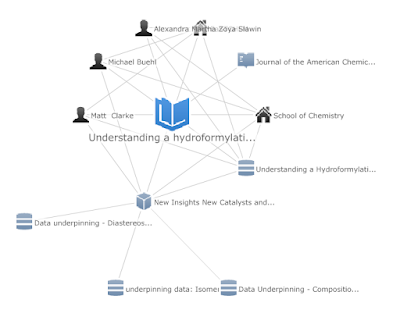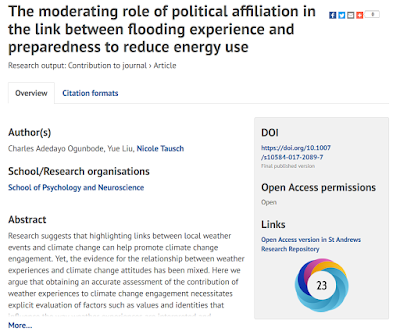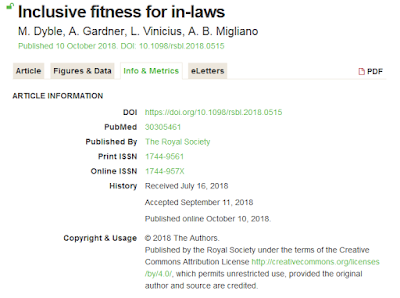Breaking free – out of embargo
The route to Open Access can be surprisingly long and winding. In this last post for Open Access Week 2018 we look at some examples of publications that are now freely available to all from our repository – in most cases a year or more after first publication.
Why wait to make these articles open access, you may ask? Because… “copyright”
The latest article to become open access after a 12 month embargo is:
Understanding a hydroformylation catalyst that produces branched aldehydes from alkyl alkenes, Dingwall, Paul; Fuentes, José A.; Crawford, Luke; Slawin, Alexandra Martha Zoya; Buehl, Michael; Clarke, Matthew L. In: Journal of the American Chemical Society. http://hdl.handle.net/10023/16318
This paper adds to the ever increasing number of freely available publications from our research community – this week we celebrated the milestone of 15,000 items in St Andrews Research Repository!
“This paper is a detailed study aiming to understand a catalytic reaction that gave unexpected products, discovered in St Andrews a few years before. Gaining understanding of how chemical reactions work is of importance, since these type of insights often allow chemists to improve upon their initial work. In this case the catalyst can make chemicals that are used for things as diverse as making BPA-free babies bottles, to fragrances, paints and pharmaceuticals. This paper uses an arsenal of different techniques to provide an explanation for why the reactions give the unusual selectivity that we saw. The overall project continues and we are using these insights as inspiration for new catalysts.” (Professor Matt Clarke, School of Chemistry)
The underlying dataset for this article is already available from the St Andrews Research Portal. Our research portal is a great way to see related content:
 |
| Publication with related content (authors, affiliations, underlying data, projects) |
For the last few weeks we have highlighted some other articles that are now open access:
Climate Change research: The moderating role of political affiliation in the link between flooding experience and preparedness to reduce energy use – paper by @st_psy @univofstandrews now out of embargo and #OA at https://t.co/Y1yo27Udjs #OpenAccessStAndrews— Jackie Proven (@jackieproven) October 18, 2018
Details and link to the OA version from the St Andrews Research Portal:
On the importance of #dancing: The dancing front: dancing, morale, and the war effort in Britain during World War II – paper by @StAndrewsHist @univofstandrews out of embargo and now #OA at https://t.co/llTeJM00w9 #OpenAccessStAndrews— Jackie Proven (@jackieproven) October 19, 2018
Owls! Latest #OA article just out of embargo from @univofstandrews Research Repository – Factors determining the frequency and productivity of double brooding of Barn Owls – https://t.co/Ck79CgR0v1 by Will Cresswell, School of Biology @StAndrewsUniLib #OpenAccessStAndrews— Jackie Proven (@jackieproven) September 10, 2018
All ‘out of embargo’ tweets at #OpenAccessStAndrews
Why wait to make these articles open access, you may ask? Because… “copyright”, I may answer.
In most cases when publishing in traditional subscription-based journals, authors will sign a copyright agreement which means effectively passing the rights of distribution to the publisher. It might be a Copyright Transfer Agreement (CTA), or an exclusive Licence to Publish. Either way, from the point of acceptance the publisher gains the right to decide how the work will be disseminated. See an example exert from a typical CTA below:
 |
| Transfer of copyright, extract from Wiley sample CTA |
Of course the authors retain some rights and in most cases this will include the right to disseminate a version of the work, usually the author-created accepted version, with some restrictions.
 |
| Author Rights, extract from Wiley sample CTA |
This process of ‘green’ open access is enabled through deposit in our repository. Our previous post going ‘behind the scenes‘ described some of the work that goes into the deposit process.
In contrast to the ‘green OA’ scenario where copyright is assigned or licensed to the publisher, authors will usually retain copyright in articles that are published with immediate open access (often called Gold OA). The recently published article ‘Inclusive fitness for in-laws‘ which was the 15,000th item in St Andrews Research Repository is an example of author-retained copyright and an end-user licence permitting unrestricted use:
If you have questions about copyright in relation to open access – get in touch with us – email: [email protected]

